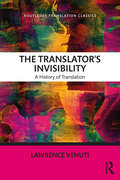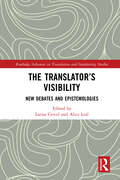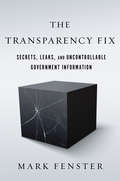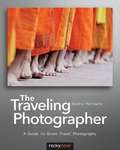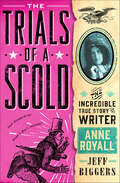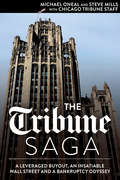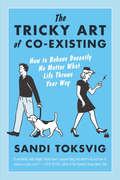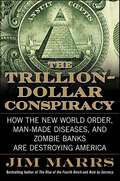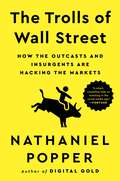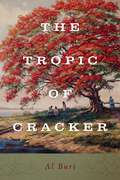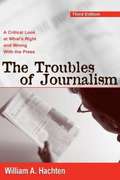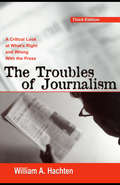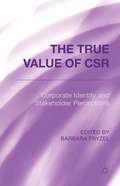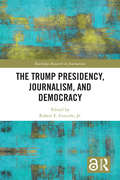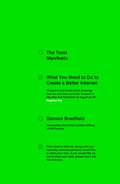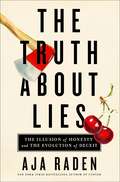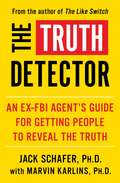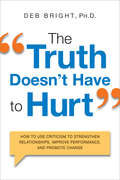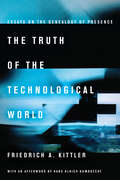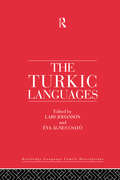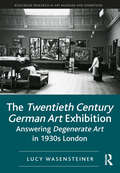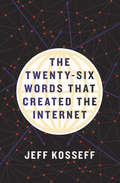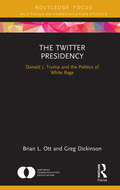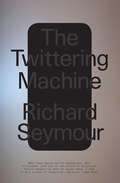- Table View
- List View
The Translator's Invisibility: A History of Translation (Routledge Translation Classics)
by Lawrence VenutiSince publication over twenty years ago, The Translator’s Invisibility has provoked debate and controversy within the field of translation and become a classic text. Providing a fascinating account of the history of translation from the seventeenth century to the present day, Venuti shows how fluency prevailed over other translation strategies to shape the canon of foreign literatures in English and investigates the cultural consequences of the receptor values which were simultaneously inscribed and masked in foreign texts during this period. Reissued with a new introduction, in which the author provides a clear, detailed account of key concepts and arguments in order to issue a counterblast against simplistic interpretations, The Translator’s Invisibility takes its well-deserved place as part of the Routledge Translation Classics series. This book is essential reading for students of translation studies at all levels.
The Translator’s Visibility: New Debates and Epistemologies (Routledge Advances in Translation and Interpreting Studies)
by Alice Leal Larisa CercelThis collection illuminates the epistemological and philosophical underpinnings of Lawrence Venuti’s seminal The Translator’s Invisibility, extending these conversations through a contemporary lens of epistemic justice while also exploring its manifestations and transposing it to different disciplines and contexts.The volume is divided into five parts. The opening chapters provide contemporary foundations and a clear epistemological apparatus to conceptualise the debate on the translator’s visibility and explore some of the philosophical underpinnings of the debate. The following chapters offer analysis of some contemporary manifestations and illustrations of the translator’s visibility among translators and translation thinkers and restage the debate in diverse contexts – such as in European Union identity politics and Chinese Buddhist translation – and disciplines – such as film studies. A final chapter takes stock of the impact of machine translation to critically reflect on the future of translation and translator studies.This book will be of interest to students and scholars in translation and interpreting studies, philosophy, cultural studies and literary studies, as well as the humanities more broadly.
The Transparency Fix: Secrets, Leaks, and Uncontrollable Government Information
by Mark FensterIs the government too secret or not secret enough? Why is there simultaneously too much government secrecy and a seemingly endless procession of government leaks? The Transparency Fix asserts that we incorrectly assume that government information can be controlled. The same impulse that drives transparency movements also drives secrecy advocates. They all hold the mistaken belief that government information can either be released or kept secure on command. The Transparency Fix argues for a reformation in our assumptions about secrecy and transparency. The world did not end because Julian Assange, WikiLeaks, and Edward Snowden released classified information. But nor was there a significant political change. "Transparency" has become a buzzword, while secrecy is anathema. Using a variety of real-life examples to examine how government information actually flows, Mark Fenster describes how the legal regime's tenuous control over state information belies both the promise and peril of transparency. He challenges us to confront the implausibility of controlling government information and shows us how the contemporary obsession surrounding transparency and secrecy cannot radically change a state that is defined by so much more than information.
The Traveling Photographer
by Sandra PetrowitzTraveling and photography is a perfect match, but photographers are often disappointed that their images fail to meet the quality of their artistic aspirations. This book combines theoretical information, practical advice, and helpful suggestions for taking better pictures while traveling, whether you are on a local trip, enjoying your annual summer vacation or exploring a more exotic, remote destination. This book includes descriptions for how to carefully compose photos, avoid common mistakes, and achieve a unique perception of places that have been photographed many times before. Beautifully illustrated with photographs from all over the world, this guide will help you find your personal point of view, which will lead to exceptional travel photos.
The Trials of a Scold: The Incredible True Story of Writer Anne Royall
by Jeff BiggersThe Trials of a Scold, by American Book Award-winning author Jeff Biggers, is a well-researched and passionate biography of Anne Royall, one of America's first female muckrakers, who was convicted as a "common scold" in 1829 in one of the most bizarre trials in the nation's history.Anne Royall was an American original, a stranger to fear, and one of the nation's most daring, impassioned, and indomitable social critics. A servant in the house of the man she would later marry, Royall read constantly and pursued an education that few women at that time had access to. When fifteen years later she was left widowed and destitute after her husband's family declared their marriage invalid, she turned to her writing, and to her political interests. Travelling from Alabama to Washington DC to Pennsylvania, Royall was a fiercely dedicated journalist. Her tenacity earned her the first presidential interview ever granted to a woman, but she acquired enemies for her scathing denouncement of the increasingly blurry lines between church and state. Royall's pioneering role as a chronicler, publisher, muckraker, and social commentator brought to light the timeless issues that still define the great American experience: religion and politics.
The Tribune Saga
by Chicago Tribune Staff Steve Mills Michael OnealReal estate tycoon Sam Zell had big ideas for Tribune Co. when he took control of the media conglomerate in late 2007 through an $8.2 billion leveraged buyout. But the iconic company, parent of the Chicago Tribune, filed for bankruptcy less than a year later. This marked the beginning of a four-year odyssey through Chapter 11 reorganization-brought on by falling advertising revenue amid a $13 billion debt burden that the deal created.The company's saga mirrored the U.S. financial crisis, in which speculative risk using exotic investment instruments helped trigger what became known as the Great Recession. When the company finally emerged from court protection at the end of 2012 under new ownership and a newly appointed board of directors, it did so with a diminished value and a tarnished reputation.Chicago Tribune reporters Michael Oneal and Steve Mills rely on thousands of pages of court documents, dozens of interviews, and hours of observation in U.S. bankruptcy court to tell the story of Tribune Co.'s journey through bankruptcy. They place a spotlight on the key decisions and missed opportunities that marked a perilous time in the history of the company, the media industry, and the economy.Their four-part series, repackaged into The Tribune Saga: A Leveraged Buyout, An Insatiable Wall Street and a Bankruptcy Odyssey, serves as a compelling resource for law, business, and journalism students and for anybody interested in how Zell's buyout of Tribune Co. became "a messy product of the unchecked Wall Street deal-making and aggressive financial engineering that soon would threaten the American economy."
The Tricky Art of Co-Existing: How to Behave Decently No Matter What Life Throws Your Way
by Sandi Toksvig“If you do it right, being a grown-up is just like being a kid . . . but without people telling you off.” No one learns “etiquette” anymore (except by embarrassing trial and error). But manners are more than a dusty tradition: Done right, they make life easier—for everyone! That’s why Sandi Toksvig highlights decency rather than convention in this entertaining guide, with:Spot-On Advice: “Remember—you don’t have to answer the phone, so don’t do it if you don’t have time to be polite.”Fascinating Trivia: “It is very rude to clear the plate of someone who hasn’t finished. In fact, the Romans believed doing so would bring about the diner’s sudden death.”And Her Characteristic Wit: “Focusing on the people you share a meal with is both a pleasure and a necessity. Get to know your family members; you might even like them.”Be the most decently behaved person in the room, and the most interesting: Master The Tricky Art of Co-Existing!
The Trillion-Dollar Conspiracy: How the New World Order, Man-Made Diseases, and Zombie Banks Are Destroying America
by Jim Marrs“Jim Marrs can’t be ignored. Few in this country shout about The Truth louder than he.”—Dallas ObserverIn The Trillion-Dollar Conspiracy, Jim Marrs, the New York Times bestselling author of Rule by Secrecy and The Rise of The Fourth Reich, offers a terrifying proposition: that the current economic collapse has been engineered by a tyrannous government and multinational corporations determined to enslave us. Read The Trillion-Dollar Conspiracy and find out how the New World Order, man-made diseases, and zombie banks are destroying America.
The Trolls of Wall Street: How the Outcasts and Insurgents Are Hacking the Markets
by Nathaniel PopperThe dramatic story of an improbable gang of self-proclaimed “degenerates” who made WallStreetBets into a cultural movement that moved from the fringes of the internet to the center of Wall Street, upending the global financial markets and changing how an entire generation thinks about money, investing, and themselves. Jaime Rogozinski and Jordan Zazzara were not what anyone would mistake for traditional financial power players. But they turned WallStreetBets, a subreddit focused on risky financial trading, into one of the most disruptive forces to bubble up from the fringes of the internet. This crude and unassuming message board harnessed the power of memes and trolling to create a new kind of online community. The group intertwined with the distrust and turmoil of our times and spoke to a generation of young men who were struggling to find their place in the world. Deeply reported and fast moving, The Trolls of Wall Street is the suspenseful story of the people who made and lost millions, battling with each other—and with Wall Street—for power and status. It is a sobering account of how millions of young Americans became obsessed with money and the markets, casting a long and lasting influence over finance, politics, and popular culture.
The Tropic of Cracker (Florida History and Culture)
by Al BurtAl Burt’s Tropic of Cracker is a state of mind shared by those who love "what remains of the Florida that needed no blueprint or balance sheet for its creation, that was here before there was a can opener or a commercial or a real-estate agent." In his years of roving the state as a Miami Herald columnist, Al Burt mapped Florida’s Tropic of Cracker, not with lines of latitude and longitude but with stories.The Crackers Burt tells of are men and women from Apalachicola to the Everglades, from Tallahassee to the Keys. They lived in the late 1800s, and they live today—along the Ocklawaha and in the floodplains of Lake Okeechobee. They were cow hunters, Conchs, and alligator men. They grew oranges, sugarcane, and muscadine grapes. They made moonshine. They drove mules, ate fried mullet, and told yarns in a Cracker creole about Florida’s panthers, snakes, alligators, and hurricanes. There are luminaries among them—Zora Neale Hurston, Marjorie Kinnan Rawlings, Virgil Hawkins, John DeGrove, Harry Crews—but mostly they are just regular folk who mark the borders of the elusive and magical Tropic of Cracker.For anyone who loves the old Florida, Tropic of Cracker is the state’s truest road map and Al Burt its most eloquent cartographer.A volume in the Florida History and Culture series, edited by Raymond Arsenault and Gary R. Mormino
The Troubles of Journalism
by William A. HachtenTaking stock of the current news environment, author William A. Hachten provides this thorough update to his insider's examination of the U.S. journalism profession. He considers the critiques of journalism and evaluates the changes taking place that have resulted in both positive and negative outcomes.
The Troubles of Journalism: A Critical Look at What's Right and Wrong With the Press
by William A. HachtenThis book looks at criticisms of the journalism profession and evaluates many of the changes in journalism--both positive and negative. In addition, it suggests what the many changes mean for this nation and indeed for the world at large, as American journalism--its methods and standards--has markedly influenced the way many millions overseas receive news and view their world. Based on author William Hachten's 50-year involvement with newspapers and journalism education, The Troubles of Journalism serves as a realistic examination of the profession, and is appropriate for upper-level undergraduate courses in journalism and media criticism. Since the previous edition of The Troubles of Journalism, many significant challenges have occurred in the media: the events of September 11, the war on terrorism, mergers and consolidation of media ownership, new concerns about press credibility, the expanding and controversial role of cable news channels, the growing impact role of news and comment on the Internet, and continuing globalization and controversy over the role of American media in international communications. To do justice to these recent "troubles" of the news media, important additions and modifications have been made in every chapter of this Third Edition.
The True Value of CSR
by Barbara FryzelBy considering the importance of Corporate Social Responsibility (CSR) as a business paradigm but also as a growing scepticism about it's outcomes, The True Value of CSR answers questions about true value behind this concept, motivations of firms embedding CSR in their core strategies and a capacity of CSR to make a real difference on the market.
The Trump Presidency, Journalism, and Democracy (Routledge Research in Journalism)
by Robert E. Gutsche Jr.This book examines the disruptive nature of Trump news – both the news his administration makes and the coverage of it – related to dominant paradigms and ideologies of U.S. journalism. By relying on conceptualizations of media memory and "othering" through news coverage that enhances socio-conservative positions on issues such as immigration, the book positions this moment in a time of contestation. Contributors ranging from scholars, professionals, and media critics operate in unison to analyze today’s interconnected challenges to traditional practices within media spheres posed by Trump news. The outcomes should resonate with citizens who rely on journalism for civic engagement and who are active in social change
The Trust Manifesto: What you Need to do to Create a Better Internet
by Damian BradfieldFrom the moment we wake up and unlock our phones, we're producing data. We offer up our unique fingerprint to the online world, scan our route to work, listen to a guided meditation or favourite playlist, slide money around, share documents and update our social media accounts. We reach for our phones up to 200 times a day, not knowing which companies are storing, using, selling and manipulating our data. But do we care? We're busy. We've got lives. We're pressed for time! There aren't enough hours in the day to read the terms and conditions. Or, maybe we're happy to trade our personal data for convenient services and to make our lives easier?Big data is the phenomenon of our age, but should we trust it without question? This is the trust dilemma.In 2009, Damian Bradfield founded WeTransfer, the largest file-sharing platform in the world with 50 million global users shipping more than one billion files of data a month. His unique experience of the big data economy has led him to question if there is another way to build the internet, one that is fairer and safer for everyone and, in The Trust Manifesto, he lays out this vision.
The Truth About Lies: The Illusion of Honesty and the Evolution of Deceit
by Aja RadenWhy do you believe what you believe?You’ve been lied to. Probably a lot. We’re always stunned when we realize we’ve been deceived. We can’t believe we were fooled: What was I thinking? How could I have believed that?We always wonder why we believed the lie. But have you ever wondered why you believe the truth? People tell you the truth all the time, and you believe them; and if, at some later point, you’re confronted with evidence that the story you believed was indeed true, you never wonder why you believed it in the first place. In this incisive and insightful taxonomy of lies and liars, New York Times bestselling author Aja Raden makes the surprising claim that maybe you should.Buttressed by history, psychology, and science, The Truth About Lies is both an eye-opening primer on con-artistry—from pyramid schemes to shell games, forgery to hoaxes—and also a telescopic view of society through the mechanics of belief: why we lie, why we believe, and how, if at all, the acts differ. Through wild tales of cons and marks, Raden examines not only how lies actually work, but also why they work, from the evolutionary function of deception to what it reveals about our own.In her previous book, Stoned, Raden asked, “What makes a thing valuable?” In The Truth About Lies, she asks “What makes a thing real?” With cutting wit and a deft touch, Raden untangles the relationship of truth to lie, belief to faith, and deception to propaganda. The Truth About Lies will change everything you thought you knew about what you know, and whether you ever really know it.
The Truth Detector: An Ex-FBI Agent's Guide for Getting People to Reveal the Truth (The Like Switch Series #2)
by Jack SchaferThis paradigm shifting how-to guide effortlessly teaches you how to outwit liars and get them to reveal the truth—from former FBI agent and author of the &“practical and insightful&” (William Ury, coauthor of Getting to Yes) bestseller The Like Switch.Unlike many other books on lie detection and behavioral analysis, this revolutionary guide reveals the FBI-developed practice of elicitation, the field-tested technique for encouraging people to provide information they would otherwise keep secret. Now you can learn this astonishing method directly from the expert who created this technique and pioneered it for the FBI&’s Behavioral Analysis Program. Filled with easy-to-follow, accessible lessons reinforced by fascinating stories of how to put these skills into action using natural human behaviors, The Truth Detector shows you all of the tips and techniques you need to gain someone&’s trust and get liars to reveal the truth.
The Truth Doesn't Have to Hurt: How to Use Criticism to Strengthen Relationships, Improve Performance, and Promote Change
by Deb BrightNobody likes criticism. Handled poorly, it too often stings and breeds resentment--and most of us try to avoid it at all costs. But criticism--crafted carefully and communicated skillfully--promotes trust and respect, motivates individuals, and serves as a catalyst for change. It has the ability to turbocharge workplaces and careers. If that sounds far-fetched, it's because few understand how to properly give and receive the kind of critical feedback that brings positive results. The Truth Doesn't Have to Hurt rejuvenates this powerful but neglected art form. Executives, managers, team leaders--anyone who needs to temper praise with a dose of reality--will learn to: Deliver the truth and have it taken as helpful * Create an atmosphere of acceptance * Avoid mistakes that sabotage an exchange * Control how they receive criticism so they benefit--even if it's badly presented Ignoring problems or always saying nice things will only maintain the status quo. This research-backed book delivers proven techniques and tools for motivating people and triggering improvement--swiftly and painlessly.
The Truth of the Technological World: Essays on the Genealogy of Presence
by translated by Erik Butler Friedrich A. KittlerFriedrich Kittler (1943-2011) combined the study of literature, cinema, technology, and philosophy in a manner sufficiently novel to be recognized as a new field of academic endeavor in his native Germany. "Media studies," as Kittler conceived it, meant reflecting on how books operate as films, poetry as computer science, and music as military equipment. This volume collects writings from all stages of the author's prolific career. Exemplary essays illustrate how matters of form and inscription make heterogeneous source material (e. g. , literary classics and computer design) interchangeable on the level of function--with far-reaching consequences for our understanding of the humanities and the "hard sciences. " Rich in counterintuitive propositions, sly humor, and vast erudition, Kittler's work both challenges the assumptions of positivistic cultural history and exposes the over-abstraction and language games of philosophers such as Heidegger and Derrida. The twenty-three pieces gathered here document the intellectual itinerary of one of the most original thinkers in recent times--sometimes baffling, often controversial, and always stimulating.
The Turkic Languages (Routledge Language Family Series)
by Lars Johanson Éva Ágnes JohansonThe Turkic Languages examines the modern languages within this wide-ranging language family and gives an historical overview of their development.The first part covers generalities, providing an introduction to the grammatical traditions, subgrouping and writing systems of this language family.The latter part of the book focuses on descriptions of the individual languages themselves. Each language description gives an overview of the language followed by detail on phonology, morphology, syntax, lexis and dialects. The language chapters are similarly structured to enable the reader to access and compare information easily.Each chapter represents a self-contained article written by a recognised expert in the field. Suggestions are made for the most useful sources of further reading and the work is comprehensively indexed.
The Twentieth Century German Art Exhibition: Answering Degenerate Art in 1930s London (Routledge Research in Art Museums and Exhibitions)
by Lucy WasensteinerThis book represents the first study dedicated to Twentieth Century German Art, the 1938 London exhibition that was the largest international response to the cultural policies of National Socialist Germany and the infamous Munich exhibition Degenerate Art. Provenance research into the catalogued exhibits has enabled a full reconstruction of the show for the first time: its contents and form, its contributors and their motivations, and its impact both in Britain and internationally. Presenting the research via six case-study exhibits, the book sheds new light on the exhibition and reveals it as one of the largest émigré projects of the period, which drew contributions from scores of German émigré collectors, dealers, art critics, and from the ‘degenerate’ artists themselves. The book explores the show’s potency as an anti-Nazi statement, which prompted a direct reaction from Hitler himself.
The Twenty-Six Words That Created the Internet
by Jeff Kosseff"No provider or user of an interactive computer service shall be treated as the publisher or speaker of any information provided by another information content provider."Did you know that these twenty-six words are responsible for much of America's multibillion-dollar online industry? What we can and cannot write, say, and do online is based on just one law—a law that protects online services from lawsuits based on user content. Jeff Kosseff exposes the workings of Section 230 of the Communications Decency Act, which has lived mostly in the shadows since its enshrinement in 1996. Because many segments of American society now exist largely online, Kosseff argues that we need to understand and pay attention to what Section 230 really means and how it affects what we like, share, and comment upon every day.The Twenty-Six Words That Created the Internet tells the story of the institutions that flourished as a result of this powerful statute. It introduces us to those who created the law, those who advocated for it, and those involved in some of the most prominent cases decided under the law. Kosseff assesses the law that has facilitated freedom of online speech, trolling, and much more. His keen eye for the law, combined with his background as an award-winning journalist, demystifies a statute that affects all our lives –for good and for ill. While Section 230 may be imperfect and in need of refinement, Kosseff maintains that it is necessary to foster free speech and innovation. For filings from many of the cases discussed in the book and updates about Section 230, visit jeffkosseff.com
The Twitter Book (O'reilly Ser.)
by Tim O'Reilly Sarah MilsteinTwitter is not just for talking about your breakfast anymore. It's become an indispensable communications tool for businesses, non-profits, celebrities, and people around the globe. With the second edition of this friendly, full-color guide, you'll quickly get up to speed not only on standard features, but also on new options and nuanced uses that will help you tweet with confidence. Co-written by two widely recognized Twitter experts, The Twitter Book is packed with all-new real-world examples, solid advice, and clear explanations guaranteed to turn you into a power user. Use Twitter to connect with colleagues, customers, family, and friends Stand out on Twitter Avoid common gaffes and pitfalls Build a critical communications channel with Twitter--and use the best third-party tools to manage it. Want to learn how to use Twitter like a pro? Get the book that readers and critics alike rave about.
The Twitter Presidency: Donald J. Trump and the Politics of White Rage (NCA Focus on Communication Studies)
by Brian L. Ott Greg DickinsonThe Twitter Presidency explores the rhetorical style of President Donald J. Trump, attending to both his general manner of speaking as well as to his preferred modality. Trump’s manner, the authors argue, reflects an aesthetics of white rage, and it is rooted in authoritarianism, narcissism, and demagoguery. His preferred modality of speaking, namely through Twitter, effectively channels and transmits the affective dimensions of white rage by taking advantage of the platform’s defining characteristics, which include simplicity, impulsivity, and incivility. There is, then, a structural homology between Trump’s general communication practices and the specific platform (Twitter) he uses to communicate with his base. This commonality between communication practices and communication platform (manner and modality) struck a powerful emotive chord with his followers, who feel aggrieved at the decentering of white masculinity. In addition to charting the defining characteristics of Trump’s discourse, The Twitter Presidency exposes how Trump’s rhetorical style threatens democratic norms, principles, and institutions.
The Twittering Machine
by Richard SeymourA brilliant probe into the political and psychological effects of our changing relationship with social mediaFormer social media executives tell us that the system is an addiction-machine. We are users, waiting for our next hit as we like, comment and share. We write to the machine as individuals, but it responds by aggregating our fantasies, desires and frailties into data, and returning them to us as a commodity experience. The Twittering Machine is an unflinching view into the calamities of digital life: the circus of online trolling, flourishing alt-right subcultures, pervasive corporate surveillance, and the virtual data mines of Facebook and Google where we spend considerable portions of our free time. In this polemical tour de force, Richard Seymour shows how the digital world is changing the ways we speak, write, and think. Through journalism, psychoanalytic reflection and insights from users, developers, security experts and others, Seymour probes the human side of the machine, asking what we&’re getting out of it, and what we&’re getting into. Social media held out the promise that we could make our own history–to what extent did we choose the nightmare that it has become?
